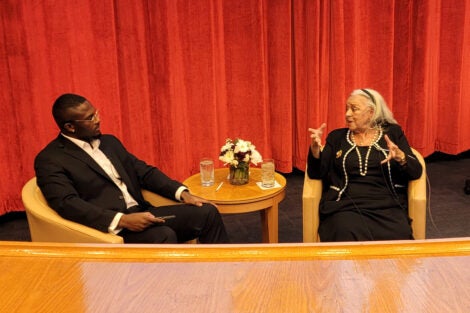Yerby Lecturer shares lessons learned in roles at Howard University, NIH
February 14, 2024 – Vivian Pinn grew up in rural Halifax County, Virginia, during the 1940s and 1950s. Her grandparents were often sick, her grandfather with cancer and her grandmother with diabetes. Even as a child she helped take care of them, giving them injections of pain medicine or insulin—an experience that inspired her to pursue a career as a doctor.
“It really was that initial care of my grandparents. Not everybody can deal with people who are suffering, and I had no problem being there, because I always wanted to make them feel better,” she said. “That’s why I went into medicine.”
Pinn spoke on February 7 at the Yerby Diversity Lecture in Public Health at Harvard T.H. Chan School of Public Health. A senior scientist emerita at the Fogarty International Center at the National Institutes of Health (NIH), she shared anecdotes and lessons learned from her long career, from being the only woman and Black person in her medical school class to serving as the founding director of the NIH Office of Research on Women’s Health (ORWH).
The annual lecture, organized by the Office of Diversity and Inclusion, is named in honor of Alonzo Yerby, MPH ’48, an African American pioneer in public health. It brings scientists and scholars from underrepresented backgrounds to Harvard Chan School to speak on important health topics.
“In 1966, as the only Black tenured faculty member at the School, Dr. Yerby served as a role model and advisor on career issues to others from underrepresented backgrounds pursuing careers in health,” said Jane Kim, dean for academic affairs and K.T. Li Professor of Health Economics, in her welcome remarks. “This lecture embodies the values and dedication of his pioneering work in public service in academia.”
Advancing women’s health
Pinn specialized in pathology during her medical training, and her career in the field eventually led her to becoming a professor and pathology department chair at Howard University. Additionally, on her own time, Pinn worked on women’s and minority health issues. She spoke at health fairs in the evenings, and talked on the phone with concerned women and minority patients to explain their specific diagnoses.
In 1991, Pinn was tapped to become the first ORWH director. “I’ve been doing this [work] on my own for so long,” she remembered thinking. She drew on her experience to build the mission and goals of the office.
Pinn said that she faced backlash for her work. “People said, ‘We don’t need to do this. This is just being politically correct, and it’s just wasting our money,’” she said.
Despite the challenges, ORWH’s efforts led Congress to pass the NIH Revitalization Act of 1993, which required the inclusion of women and minorities in NIH-funded clinical research. The office also created other initiatives to promote women’s health, such as a program to support the careers of researchers studying the topic.
Mentoring the next generation
Back when Pinn was still in medical school, she sought out mentorship from other women in her field. At that time, there was only one senior faculty member who was a woman, but she was not interested in speaking with Pinn. Since then, Pinn has made it a point to support her students.
“I learned from what I experienced with her and that rejection that I had to be there for these students,” she said. “Most of the time, they just want advice, and some just want to talk to somebody who understood what they saw as Blacks or minorities in a white institution.”
“My greatest achievements are those reflected by the students I have taught who really feel or who say that I helped influence what they’re doing,” she added. “I hope that those that helped me along the way can feel the same thing about what they did.”
– Jay Lau
Photo: Jay Lau
